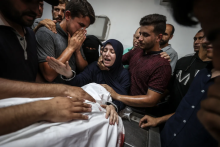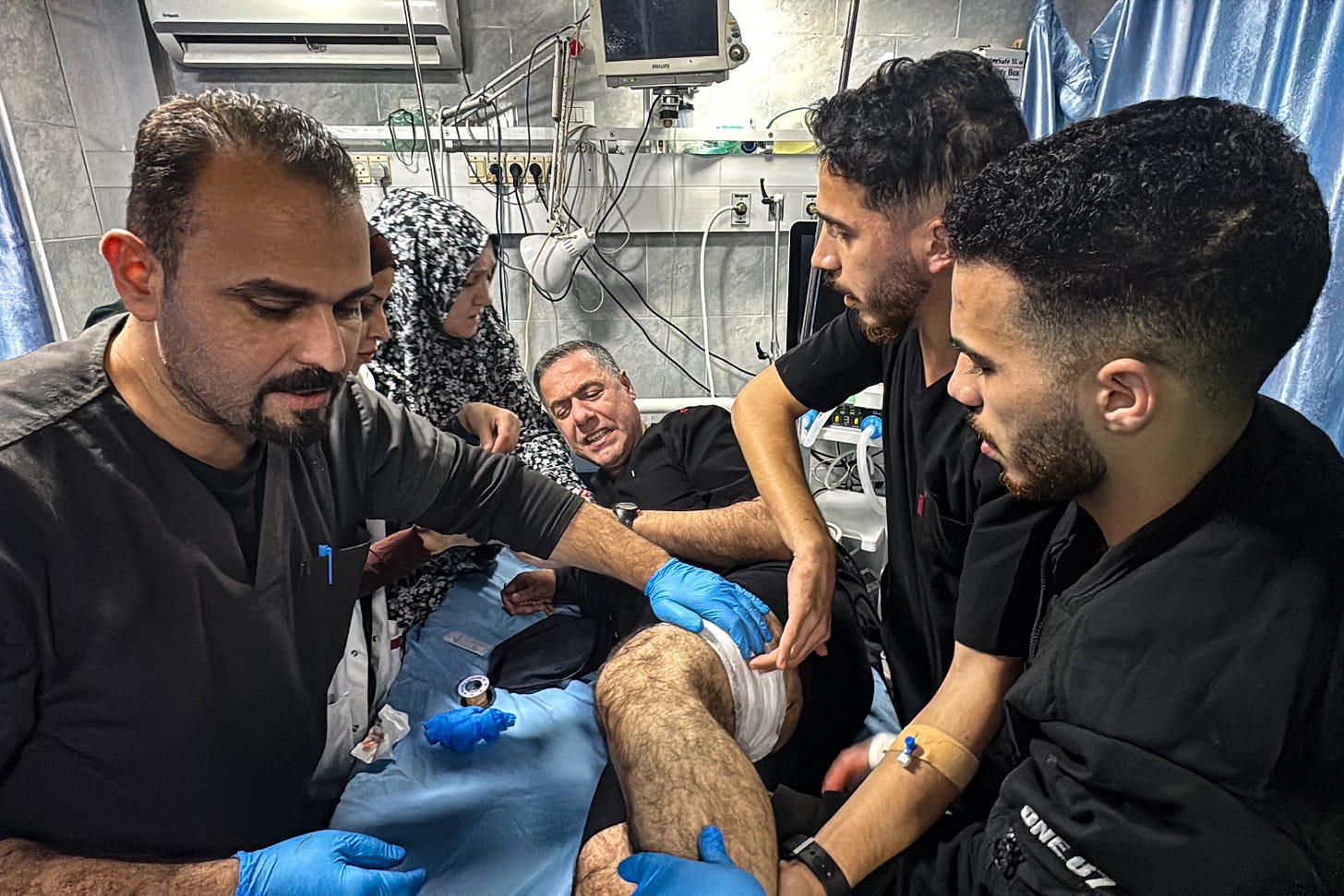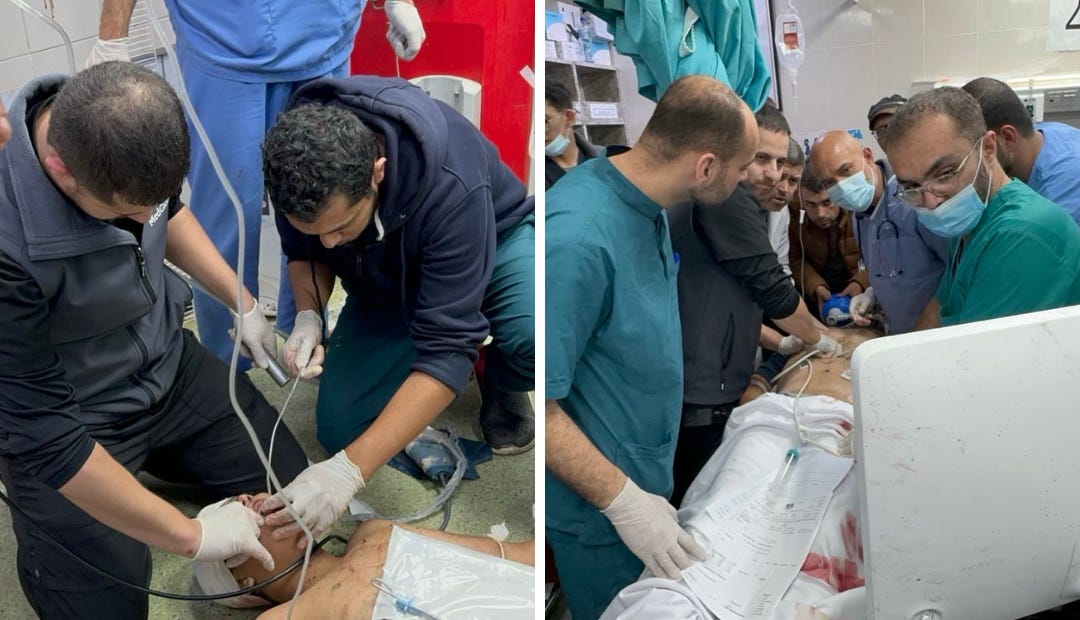
Friends and relatives mourn after Israel killed Indonesian Hospital director, Dr. Marwan al-Sultan, along with seven of his members in a targeted strike on his home on July 2, 2025. Photo by Ali Jadallah/Anadolu via Getty Images
The healthcare system in Gaza is not simply collapsing – it is being dismantled by design through targeted killing, abduction, and imprisonment of Palestinian doctors, nurses, and first responders.
Since Oct. 7, 2023, Israeli authorities have abducted more than 400 Palestinian medical professionals – a systematic erasure of those tasked with preserving life. Some remain in custody. Some have been released and recount harrowing abuse. Others have not survived.
Just this Monday, Israeli forces seized Dr. Marwan al-Hummas, the director of Abu Yousef al-Najjar Hospital in Rafah. That same day, they raided the World Health Organization's staff residence in Deir al-Balah, mistreating and detaining WHO staff and family members. One staff member is still being held, the WHO chief said on Wednesday.
These are not isolated war crimes. Israel’s attacks on Gaza’s healthcare system are part of a broader strategy to render the territory unlivable for Palestinians – a campaign of ethnic cleansing and genoci
A Grim Choice
For me, these assaults are personal. In early 2024, I worked at Nasser Hospital. Israeli forces later stormed the facility, destroyed parts of its infrastructure, expelled displaced civilians seeking shelter inside, and detained dozens of staff, including doctors. Some were later released, beaten, and broken. Others never came back.
One of my colleagues at Nasser lost his son in an airstrike. Still, he stayed behind to care for survivors – his way of coping. He was arrested during the raid and remains in custody.
This is the grim choice every Palestinian medical worker faces: serve and be targeted, or flee and abandon your patients to die.
Dr. Hussam Abu Safiya, a pediatrician from northern Gaza, is one of those still detained. He’s been imprisoned without charge since December. His family tells me he’s still wearing the same winter clothes he was taken in, now threadbare from seven months of captivity. He’s lost an alarming amount of weight on two spoonfuls of rice a day and faced severe abuse. He has no access to medication. No access to medical care. Dr. Hussam should be at a hospital helping to lead Gaza’s recovery. Instead, he’s in a prison cell.
What was his crime? Staying. He refused to abandon newborns on ventilators at Kamal Adwan Hospital. He stayed and saved lives in a hospital under attack. For that, he was kidnapped.
He is not alone.
Dr. Marwan Al-Sultan, one of only two cardiologists left in northern Gaza and director of the Indonesian hospital, was killed this month by a precise Israeli airstrike on his home in Gaza City that targeted the floors where he and his family lived and left the other parts of the block untouched.
Dr. Ahmed Qandeel, a respected senior surgeon and mentor, was killed just over a week ago in an airstrike in Gaza City.
Dr. Adnan Al‑Bursh, a well-known orthopedic surgeon, was abducted, severely beaten in custody (leaving him with broken ribs and unable to walk or use the toilet independently, according to his fellow detainees’ testimony), and found dead under suspicious circumstances in Israeli custody.
There are too many stories to recount.
As the UN Human Rights Office said, ''The killing, detention and enforced disappearance of health workers in Gaza, in parallel with the systematic attacks and destruction of hospitals and other medical facilities, has had a devastating impact on the people.''
Each time a Palestinian doctor is killed or detained, it isn’t just a personal loss – it’s a collapse of community care. Patients are left without treatment. Wards are left without leadership. Babies in incubators lose their only chance of survival. A respected and dignified member of society is stripped of protected status. The death of a physician in Gaza means dozens, sometimes hundreds, of preventable deaths in the weeks and months that follow.
This is what we mean when we say Gaza’s healthcare system is under attack – from every direction.
It’s Israel’s Strategy
During my time at Nasser Hospital in Khan Younis and later at Al-Aqsa Hospital in Deir al-Balah last year, I treated patients with limited supplies, under constant threat. We worked through airstrikes. Bullet holes pierced the windows where staff would take a break. My subsequent attempts to enter Gaza as a volunteer doctor – most recently in June – have been denied by Israeli authorities, further evidence of Israel’s efforts to restrict the support and reinforcement of Palestinian healthcare capacity.
It is important to understand that the targeting of Palestinian healthcare workers is not incidental. It is a strategy. You cannot destroy a society without first destroying its ability to heal. You cannot erase a people without attacking those who preserve life.
Imagine trying to rebuild a healthcare system when so many of its best-trained professionals are dead, imprisoned, or traumatized. Who will perform surgeries when there are no surgeons? Who will care for premature infants when there are no pediatricians? Who will deliver babies when OB-GYNs have vanished? The answer is not more international volunteer doctors or NGOs attempting to fill in the gaps.
This must end.
You cannot destroy a society without first destroying its ability to heal. You cannot erase a people without attacking those who preserve life.
Their imprisonment violates international law and basic human decency. Their absence cripples an entire people’s ability to heal. The stakes for Palestinian healthcare workers are incredibly high, and the pressure is immense, but we mustn’t allow them to shoulder this burden alone. Our credibility and legitimacy are tied to their safety and success.
The work of rebuilding Gaza will be long and painful. But it cannot begin until a ceasefire is secured, Israeli troops withdraw, and Gaza's doctors are freed – literally and figuratively – from the chains placed upon them.
Dr. Thaer Ahmad is a Palestinian-American emergency room physician from Chicago. He traveled to Gaza in 2024 with humanitarian aid organizations and worked at Nasser Hospital in Khan Younis and Al-Aqsa Hospital in Deir al-Balah.
The views expressed in this article are the author’s own and do not necessarily reflect those of Zeteo.


